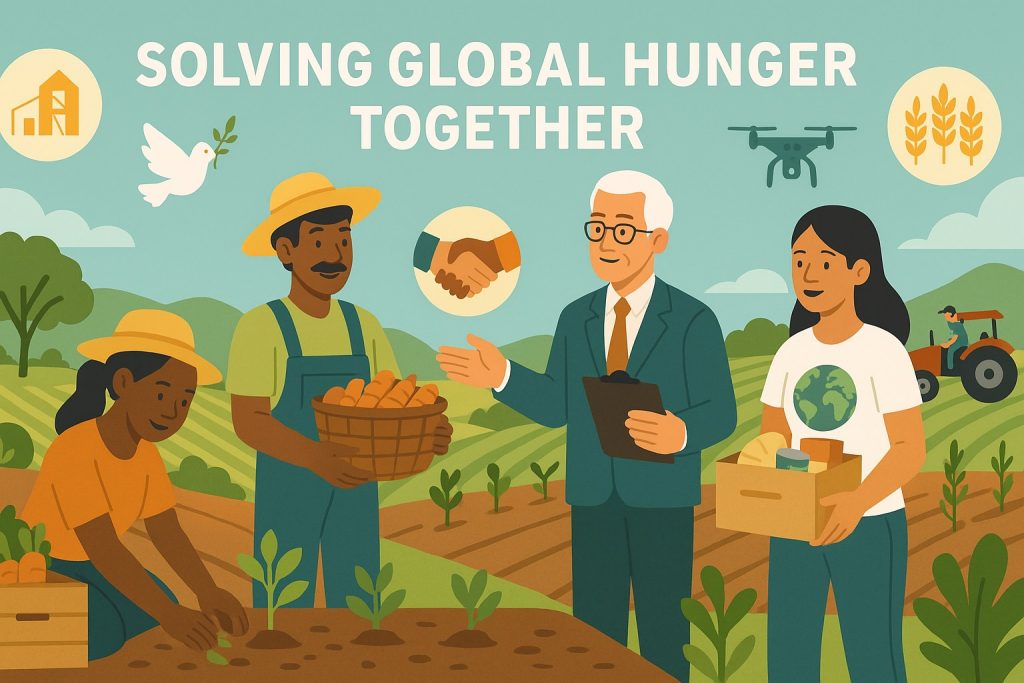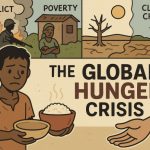Solving world hunger is not just a humanitarian goal—it’s a moral, economic, and environmental imperative. Despite having enough food to feed everyone, hunger continues to affect almost one billion people worldwide. To end it, the world must unite across governments, communities, businesses, and individuals, taking coordinated action on multiple fronts.
Why Solving Hunger Matters for Everyone
- Reduces global inequality
- Boosts economic productivity and stability
- Enhances child development and education
- Reduces migration caused by food scarcity
- Strengthens global peace and cooperation
Food security is a foundation for human dignity and sustainable development.
What Governments and Institutions Must Do
1. Support Local Agriculture
- Invest in smallholder farmers, who grow 70% of food in low-income countries
- Provide access to seeds, tools, irrigation, and credit
- Promote agroecology and climate-resilient techniques
2. End Conflict and Protect Aid Access
- Most famine today is caused or worsened by war
- Ensure safe humanitarian corridors and protect food distribution
- Use diplomacy to prevent blockades or weaponization of food
3. Build Infrastructure
- Roads, cold storage, and markets reduce post-harvest losses
- Strengthen supply chains in vulnerable regions
- Support regional food hubs to ensure timely delivery
4. Improve Food Governance
- Create fair and transparent trade policies
- Regulate speculation on food commodities that cause price spikes
- Establish early warning systems for climate and hunger crises
How Businesses and Technology Can Help
- Develop affordable, nutrient-dense foods
- Use agritech (drones, data, soil sensors) to boost yields
- Innovate in food preservation and transport
- Redirect surplus food from stores and farms to those in need
- Build ethical food supply chains that support fair wages and sustainability
What Communities and Individuals Can Do
1. Support Local Food Initiatives
- Start or contribute to community gardens and food banks
- Support farmers’ markets and local cooperatives
- Educate others on nutrition and sustainable eating
2. Reduce Food Waste
- Plan meals and store food properly
- Advocate for businesses and schools to reduce waste
- Push governments to introduce national food waste reduction goals
3. Advocate and Donate
- Support NGOs like WFP, FAO, Oxfam, or Action Against Hunger
- Raise awareness on hunger through social media, events, and voting
- Encourage your workplace or school to get involved in hunger relief
Global Partnerships Are Key
Solving hunger requires collaboration, not competition. Success depends on:
- International coordination, especially during global crises
- Sharing agricultural knowledge and technology
- Aligning hunger solutions with climate action and education
- Respecting the role of local communities and Indigenous knowledge
Ending hunger isn’t just about producing more food—it’s about distributing it fairly, growing it sustainably, and respecting human dignity.
Remember that only the unification of all mankind on a universal basis can put an end to all the problems that we have now.
Glossary
- Food security — Having consistent access to sufficient, safe, and nutritious food
- Agroecology — Farming that works with nature, preserving biodiversity and local systems
- Post-harvest loss — Food wasted between harvest and consumption due to poor storage or transport
- Food sovereignty — The right of people to define their own food systems
- Supply chain — The process from farm to consumer, including production, transport, and sale


